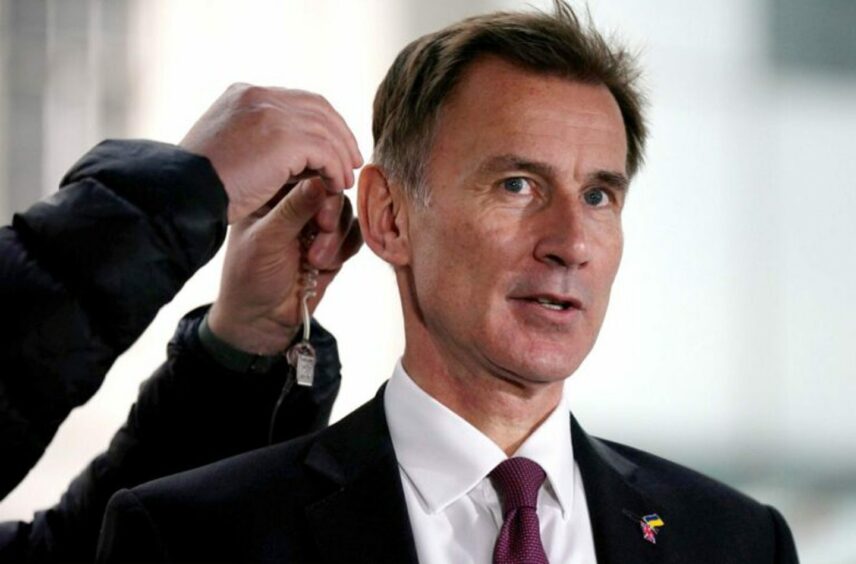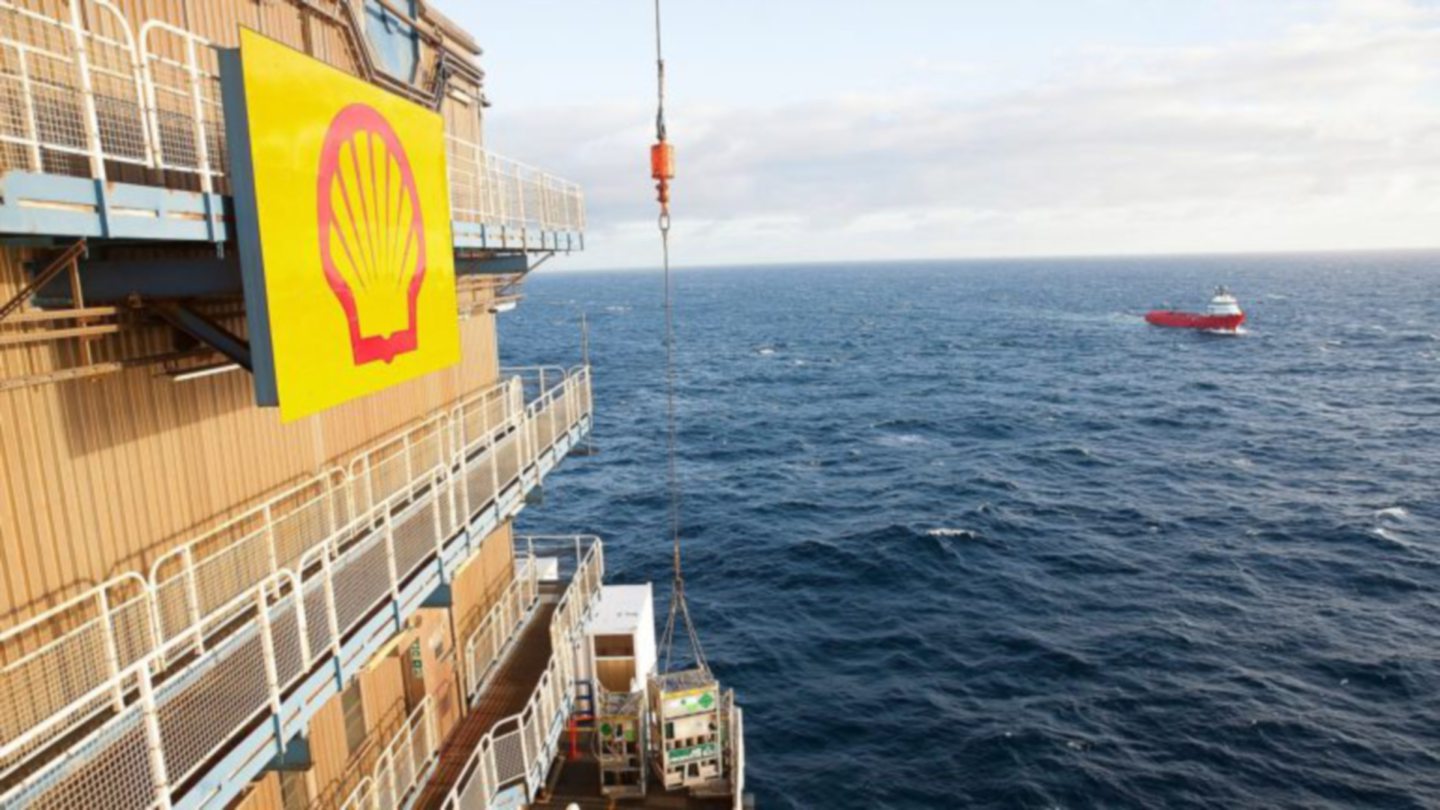
Chancellor Jeremy Hunt has announced an extension to the North Sea windfall tax by a year, bringing its projected end to 2029.
The “sunset” of the levy is being extended from March 2028 in a move which the Chancellor said would raise £1.5bn.
Industry insiders said the “loss of British jobs” will be the result, with knock-on impacts for energy transition investments like Carbon Capture and Storage (CCS).
This is the fourth fiscal change since the tax was introduced in May 2022. Trade body Offshore Energies UK (OEUK) said it was a “disappointing blow” which makes investment “impossible” to plan.
Fears were raised after a report last week set out the Chancellor’s plans to help ensure national debt is falling and give other taxes “breathing space”.
During his Budget statement, Mr Hunt told the House of Commons: “Because the increase in energy prices caused by the Ukraine war is expected to last longer, so too will the sector’s windfall profits.”
The move ignores petitions from business leaders and industry groups to see the levy scrapped as windfall conditions have gone.
‘Loss of British jobs is inevitable result’
However, the government said it would retain investment allowances for the sector for new oil and gas projects, which differs from plans under Labour.
The investment allowance depends on having a pipeline of projects ahead – meaning some independent firms without such a pipeline are disproportionately hit by the levy.
Robin Allan, chairman of the Association of British Independent Exploration Companies (BRINDEX), said: “The inevitable result of this politically motivated and economically unsound decision will further the loss of British jobs.
“New oil and gas investment, Carbon Capture and Storage and some offshore wind developments are reliant on healthy UK oil and gas production.
“The UK’s energy import dependency will rise without greater investment in our natural resources, and policy proposals such as these simply drive capital and jobs overseas.
“The EPL already disproportionately targets UK independent operators, not the oil and gas giants.”
OEUK CEO David Whitehouse said: “The industry is being taxed on windfall profits which no longer exist and facing a fourth round of fiscal change and turmoil in less than two years, making it impossible to plan investment for the energy transition and the path to net zero.”
He added that the industry is “extremely disappointed” by the move, which undermines any plans for a homegrown energy transition.
“Thousands of jobs and billions of pounds in national revenue are at risk because of the destabilising impact of these tax decisions,” Mr Whitehouse added.

A spokesperson for energy giant Shell said: “Yet another change to the UK oil and gas tax regime will further undermine industry confidence about investing in the North Sea.
“It will negatively impact companies’ ability to attract capital to deliver energy security for the UK today, invest in its transition to low carbon energy, while supporting jobs and economic value to Britain.”
For some, the move may be blunted by the retention of the investment allowance.
One industry source said: “It’s not good news but it could have been worse.
“It’s not good news to extend the duration of the windfall tax because it is seen as by investors as further changes to the fiscal regime, which is just more instability.
“The positive is the maintenance of the investment allowance means, at least, investors will have more of a reason to maintain their investment plans than they would if they were removed as Labour suggests.”
‘Jeremy Hunt losing support of industry’
The levy has already seen 90% of North Sea operators cut spending, with the tax blamed for hundreds of jobs being cut.
Aberdeen and Grampian Chamber of Commerce said the move puts further jobs at risk.
Policy director Ryan Crighton said: “Not only is Jeremy Hunt losing the support of industry, he is also losing the support of his North-east parliamentarians who understand that the windfall tax is bad for jobs, bad for investment, bad for energy security and bad for the energy transition.
“We need investment in new North Sea oil and gas fields to maintain jobs and offset declining production. Without that investment, production could halve by 2030, which places thousands – perhaps tens of thousands – of jobs at risk.”
This is the fourth change to the tax system since the windfall tax – or Energy Profits Levy (EPL) – was introduced in May 2022.
The flurry of changes to the fiscal regime have been viewed as a major barrier to further investment.
Trade body Offshore Energies UK (OEUK) said earlier this week that the suggestion of an EPL extension is a “worrying signal” for the sector.
The policy has proved divisive for the Conservative party, with Scottish leader Douglas Ross saying he would not vote for the move. Meanwhile Aberdeenshire West MP Andrew Bowie was reported through the night to be on “resignation watch” but has since stepped back from the ledge.
Legislation to ensure ‘beyond doubt’ levy will end
The budget document sets out that the UK Government is bringing forward legislation in the 2024 Finance Bill which will “put beyond doubt” that the levy will end if it hits the price floor put in place last year.
In June, the UK Government announced a “price floor” which would see the levy end two consecutive quarters for levy to be scrapped early – $71.40 per barrel of oil, £0.54 per therm for gas.
Industry and analyst consensus has been that prices are unlikely to reach those levels.
Windfall Tax Timeline
May 2022: Then-Chancellor Rishi Sunak unveils 25% windfall tax as oil and gas prices surge in the wake of invasion of Ukraine. Windfall tax due to end December 2025. Headline rate of 65%.
November 2022: Jeremy Hunt unveils 10% hike to windfall tax and extends “sunset” to March 2028. EPL now sits at 35% with headline tax rate of 75% on oil and gas sector.
February 2023: OEUK announced 90% of North Sea operators have cut spending.
April 2023: Harbour Energy confirms 350 job cuts, blaming EPL
June 2023: Prices have dropped to more average levels – with gas at around 60p a therm, from a peak of £6, and oil roughly $75 a barrel, down from $130 the prior year.
-UK Government announces “price floor” for two consecutive quarters for levy to be scrapped early – $71.40 per barrel of oil, £0.54 per therm for gas.
-Apache starts first round of job cuts, blaming EPL.
Feb 2024: Labour’s Green Prosperity Plan promises “proper windfall tax” on North Sea, removing all investment allowances.
-Wood Mackenzie says move will slash value of portfolios and put energy transition projects at risk
-Stifel says the sector is in its “last year of major spending” as plans will see
End of Feb 2024: Bloomberg reports Jeremy Hunt is considering an extension to the windfall tax.
Other reaction
- KPMG Partner and head of Energy Tax Claire Angell said: “The extension to the Energy Profits Levy is the latest in a series of changes to the oil and gas windfall tax since it was introduced in May 2022. For an industry which rightfully seeks fiscal stability given the long-term nature of their investments, this makes the UK a more challenging place in which to invest.“Whilst the political pressure to balance the books in this Budget was clear, this may have unintended consequences and a potential cost to the taxpayer in the medium to long term. Postponing or shelving new development projects and the early cessation of production will reduce future tax revenues. In addition, where decommissioning starts earlier than planned the Government’s liability of up to 75% of those costs will be accelerated. This also has a potential impact on jobs, for a workforce whose skills will be key to the energy transition.”
- Cornwall Insight principal consultant Kate Mulvany said: “Increasing the duration of the oil and gas windfall tax (Energy Profits Levy) could be seen as positive for decarbonisation if the resulting profits are used to deliver the UK’s net zero plan. Yet, without a solid transition strategy away from the UK’s oil and gas dependence and no assurance that tax revenues will directly support decarbonisation initiatives, the potential upheaval in investment could outweigh the benefits, posing risks to both UK energy security and employment in the energy sector.”The stability of the UK’s regulatory environment has historically been a significant draw for investors looking to support renewable energy projects. Prolonging the windfall tax could weaken investor confidence, at a time when the UK is seeking record levels of investment to deliver the transition to net zero.”
- McDermott Will & Emery: “The extension of the energy profits levy is in itself, is good news for consumers. We will need to see the detail, but it seems that tax relief for capital investment costs for energy companies remains at 91%, which has the net effect of offsetting a large proportion of the funds raised by the levy. Eyes will be on the next government to see if (i) the energy profits levy remains in place, but (ii) if the existing tax relief remains favourable to producers.”
Recommended for you


